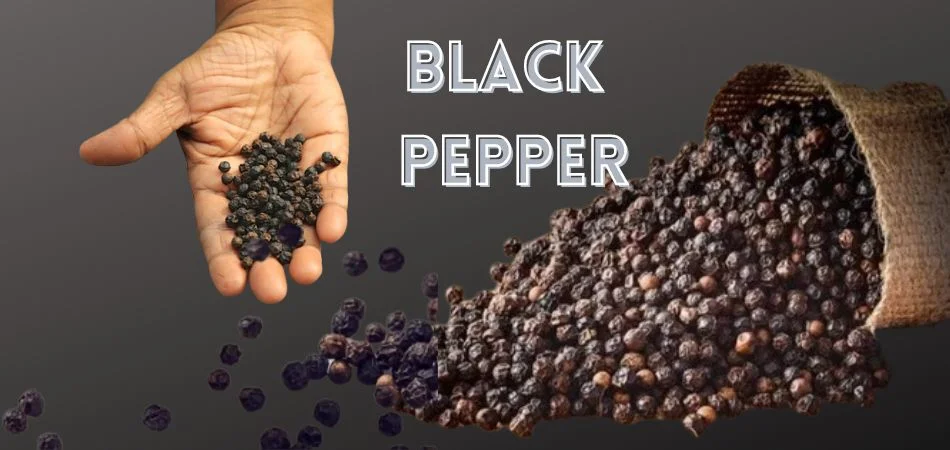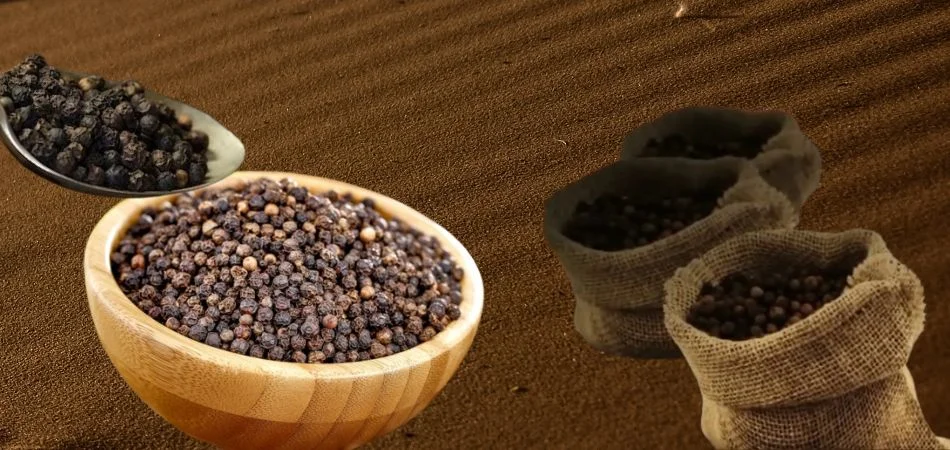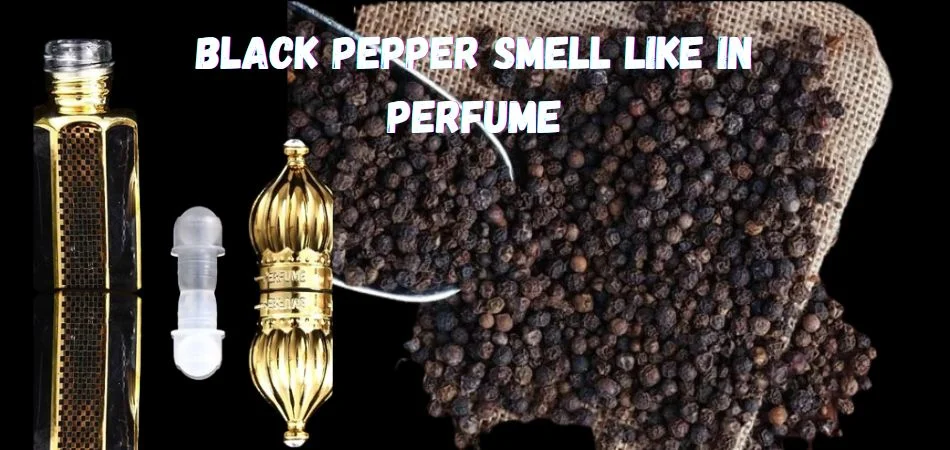Black pepper, an aromatic spice we commonly associate with our dining tables, plays an unexpectedly dynamic role in the world of perfumery. Its distinct and pungent aroma adds depth, warmth, and a touch of the exotic to fragrances. But what precisely does black pepper smell like in a perfume? Let’s embark on a sensory journey through the history, essence, and influence of this intriguing spice.
Definition of Black Pepper:
Black pepper, known scientifically as Piper nigrum, is a flowering vine that produces tiny berries, which when dried, become the peppercorns we’re familiar with. These peppercorns are ground to release their fragrant oil and pungent taste.

Origin and Historical Significance of Black Pepper:
Native to South India, black pepper’s trade routes spanned the globe as early as 2000 BCE. Recognized as the “King of Spices,” black pepper was once so valuable that it was used as currency and has been coveted by emperors, explorers, and traders throughout history.
The Importance of Scent Notes in Perfumery:
In perfumery, the harmony of a fragrance is achieved by skillfully blending various ‘notes.’ These notes, layered over one another, create the overall scent profile.
Black pepper often serves as a middle note, bridging the lighter top notes with deeper base notes, thus providing a well-rounded olfactory experience.
Black Pepper in Its Natural Form
Physical Characteristics and Cultivation:
The Piper nigrum vine thrives in tropical climates. It produces small white blossoms that eventually transform into green berries. As these berries mature, they’re harvested and dried, turning them into the characteristic black peppercorns. This drying process intensifies their aromatic qualities.
Traditional Uses and Cultural Significance:
Beyond the culinary realm, black pepper has been a staple in traditional medicine, particularly in Ayurveda, for its potential healing properties. Cultures around the world have used black pepper not only for its flavor but also as a preservation agent, an offering in sacred rituals, and even as a form of commodity money.
Initial Sensory Impressions of Black Pepper’s Aroma:
When first encountering the scent of black pepper, one is greeted with a fresh, warm, and slightly woody aroma. There’s a surprising brightness, reminiscent of citrus, that’s underpinned by a spicy, smoky depth.
This multidimensional scent is both invigorating and comforting, making it a versatile ingredient in many fragrance compositions.

Extraction and Transformation
Methods of Extraction:
Black pepper’s aromatic essence is primarily extracted using two methods: steam distillation and CO2 extraction. Steam distillation involves passing steam through crushed peppercorns, causing the essential oil to evaporate with steam.
This mixture is then cooled, allowing the oil to separate and be collected. CO2 extraction, a more modern method, uses carbon dioxide under high pressure to pull the essential oil from the pepper. This method retains more of the original scent profile and produces a purer oil.
The Change in Scent Profile Post-extraction:
While whole peppercorns offer a fresh and woody aroma, once extracted, the oil tends to have a more concentrated scent profile. The transformation intensifies its spicy, warm, and slightly sweet undertones.
The extraction process emphasizes the nuances that might be subtle in the whole peppercorn, making the oil a potent ingredient in perfumery.
Stability and Longevity of the Black Pepper Essential Oil:
Black pepper essential oil has a relatively good stability profile. Its main constituents, like β-caryophyllene and limonene, contribute to its lasting fragrance. When stored properly in cool, dark places, and in well-sealed containers, the oil can maintain its aromatic properties for several years.
Black Pepper’s Scent Profile in Perfumery
Top Notes – Immediate Olfactory Impact:
Upon the initial application, black pepper presents a crisp, spicy brightness. This immediate impact is lively, akin to citrusy notes, capturing the attention and stimulating the senses.
Heart/Middle Notes – The Evolution of the Aroma:
As the top notes begin to dissipate, the heart of black pepper reveals itself. Here, its character evolves, presenting a warm and slightly sweet spiciness, reminiscent of clove or cinnamon but with its unique peppery signature.
This phase is the bridge between the lively top and the deep base, offering a harmonious blend of freshness and warmth.
Base Notes – The Lingering Scent:
In the dry-down phase, black pepper showcases its deeper, woody and resinous facets. It leaves a comforting, smoky trail that anchors and enhances the other ingredients in a perfume composition, ensuring the fragrance has depth and longevity on the skin.
Descriptive Terms:
When trying to encapsulate the aroma of black pepper in perfumery, several terms come to mind: warm, spicy, sharp, and woody, to name a few. Additionally, there are hints of earthiness, a touch of smokiness, and an underlying sweetness that makes it complex and multifaceted.
This intricate blend of characteristics is what makes black pepper a cherished ingredient in the world of fragrances, offering both intensity and balance.
Black Pepper as a Perfume Ingredient
How It Complements Other Notes – Pairing and Blending:
Black pepper’s multifaceted aroma makes it an excellent complement to a variety of other perfume ingredients. Its spicy warmth pairs well with floral notes like rose and jasmine, enhancing their natural sweetness.
Its woody depth resonates beautifully with base notes such as sandalwood, oud, and patchouli. Citrus notes like bergamot or lemon gain an added kick when blended with the sharpness of black pepper.
Moreover, its subtle smokiness can amplify the richness of resins like frankincense or myrrh. In essence, black pepper acts as a bridge, tying together diverse scent profiles into a harmonious blend.
Popular Perfumes That Feature Black Pepper Prominently:
Black pepper has graced several iconic fragrances over the years. Some notable mentions include:
- Tom Ford’s Black Orchid: Here, black pepper intertwines with rich orchid and patchouli, creating a sensual, luxurious scent.
- Jo Malone’s Blackberry & Bay: Black pepper adds a spicy kick to the sweet blackberry and fresh bay, offering an unexpected twist.
- Le Labo’s Poivre 23: As the name suggests, this fragrance is a celebration of pepper, with its spiciness taking center stage, supported by vanilla and labdanum.
Influence on the Perfume’s Overall Character and Sillage:
Black pepper can significantly influence a perfume’s character. Its presence can transform a fragrance from merely pleasant to intriguingly complex. In terms of sillage—the trail a fragrance leaves behind—black pepper lends a distinct clarity and projection.
Fragrances with black pepper tend to have a moderate to strong sillage, making them noticeable without being overwhelming.
Benefits and Challenges
The Unique Warmth and Depth It Brings to Fragrances:
Black pepper introduces an element of surprise. Its warmth adds comfort, and its depth lends sophistication. It can elevate a simple scent profile into something memorable, making the fragrance wearer return for more.
Possible Skin Reactions or Sensitivities:
While black pepper essential oil is generally safe for use in perfumes, some individuals may exhibit sensitivities or allergic reactions to it. Symptoms might include redness, itching, or slight inflammation.
It’s always wise to do a patch test when trying a new fragrance, especially for those with sensitive skin.
The Trend of Spicy and Oriental Perfumes – The Role of Black Pepper:
Oriental and spicy perfumes have seen a resurgence in popularity in recent years, with consumers gravitating towards more opulent, rich, and exotic scents. Black pepper plays a crucial role in this trend.
Its inherent spiciness aligns perfectly with the oriental fragrance family, often characterized by warmth, depth, and sensuality. Black pepper, thus, serves as a modern nod to the age-old allure of the orient, captivating fragrance aficionados around the world.
Consumer Impressions and Reviews
Personal Experiences – How Different Individuals Perceive Black Pepper in Perfumes:
Black pepper evokes a myriad of reactions. Some find its spicy kick invigorating, likening it to a brisk morning walk, while others are drawn to its warm, comforting embrace, reminiscent of cozy evenings by the fireplace.
For a few, the scent can even trigger memories of culinary adventures, stirring recollections of kitchens filled with the tantalizing aroma of freshly ground peppercorns.
Expert Reviews – Thoughts from Perfumers and Fragrance Critics:
Perfumers often laud black pepper for its versatility and depth. Renowned fragrance critic Luca Turin once remarked on the spice’s ability to “lift” a fragrance, giving it vibrancy and character.
Other critics appreciate black pepper’s duality – its capacity to be both fresh and deep, making it a fascinating ingredient to dissect and discuss.
Popular Opinions – General Consensus in the Fragrance Community:
Within the fragrance community, black pepper is generally well-received, especially among aficionados of spicy or oriental perfumes.
Forums like Fragrantica and Basenotes often feature discussions on the best pepper-forward fragrances, with many users sharing their love for its unique, captivating aroma.
Conclusion
Black pepper’s journey from an ancient spice traded across continents to a prized ingredient in perfumery showcases its timeless appeal. Its aroma, complex and multifaceted, captures the imagination, making it a staple in countless iconic fragrances.
Perfumery is a deeply personal experience, and there’s no better way to understand the allure of black pepper than by sampling it firsthand. Readers are encouraged to delve into this aromatic world, allowing themselves to be transported by the spicy, warm embrace of black pepper-infused fragrances.
Recommendations
Tips for Testing and Wearing Spicy Fragrances:
- Sample First: Spicy fragrances can be intense. It’s wise to start with a sample or a decant before committing to a full bottle.
- Less is More: Given their potency, a spritz or two is often enough. It’s easier to add more later than to deal with an overwhelming scent.
- Apply on Pulse Points: Spicy notes evolve beautifully with body heat. Apply on wrists, behind the ears, and on the neck for the best olfactory experience.
Ways to Explore and Expand One’s Olfactory Palette:
- Blind Sniffing: Try identifying notes without looking at the fragrance pyramid. It hones the nose and makes scent exploration fun.
- Layering: Experiment with layering different fragrances. Perhaps a citrusy cologne with a black pepper-dominated perfume to create your unique blend.
- Engage with Communities: Join online forums or local fragrance groups. Swapping samples or discussing favorite scents can introduce you to fragrances you might not have considered before


